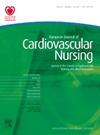室性心动过速的 EASI 监测,传统心电图的替代方案?
IF 3.9
3区 医学
Q2 CARDIAC & CARDIOVASCULAR SYSTEMS
引用次数: 0
摘要
背景 12 导联心电图(ECG)是检测室性心律失常的黄金标准。在心脏重症监护病房(UCC)中,监测系统用于检测心律失常或 ST 段急剧变化等瞬时事件。连续获取 12 条导联需要 10 个电极,这给患者造成了不适,因此完全监测并不是常规做法。基于矢量心电图的 EASI 监测系统是一种仅使用 5 个电极(4 个胸腔电极和 1 个地面电极)的替代方法,理论上可以获得完整的标准心电图。目的 本研究的主要目的是评估 EASI 监测系统与传统心电图相比对室性心动过速(VT)患者的诊断准确性。方法 本文介绍了七例因 VT 发作而入住重症监护病房的患者。患者入院后即使用 EASI 系统进行监测,并同时采集 VT 事件的常规心电图和 EASI 系统得出的心电图进行比较。根据建议,EASI 系统的 4 个电极分别放置在胸骨下缘(S)、胸骨下缘第 5 肋间水平(E)、第 5 肋间水平以及左右锁骨中线(I 和 A)上。结果 逐个病例分析,5 名患者的心动过速轴线相似,因此可以评估他们的心动过速起源。2 名患者的心动过速起源不同。这些不同的患者中,一个心动过速起源于右室流出道(心内膜),另一个起源于左室顶部(心外膜)。两名患者的心动过速各不相同,没有共同的心脏特征。图 1.结论 EASI 监测是监测重症监护病房患者的一种可行的替代方法,可为我们提供可靠的信息(与标准心电图相比),但在某些心轴不同的病例中存在局限性。对于因心律失常而入院的患者,我们有必要更好地描述这些差异,以优化其使用。本文章由计算机程序翻译,如有差异,请以英文原文为准。
EASI monitoring in ventricular tachycardia, an alternative to conventional electrocardiography?
Background 12-lead electrocardiogram (ECG) is the gold standard for detecting ventricular arrhythmias. In cardiac critical care units (UCC), monitoring systems are used to detect transient events such as arrhythmias or ST-segment acute changes. The discomfort caused in the patient by the need for 10 electrodes to obtain the 12 leads continuously means that complete monitoring is not routine. The EASI monitoring system, based on vector electrocardiography, is an alternative that uses only 5 electrodes (4 thoracic and 1 ground) and theoretically allows obtaining a complete standard ECG. Objectives The main endpoint of this study was to evaluate the diagnostic accuracy of the EASI monitoring system in patients with ventricular tachycardia (VT), compared with conventional ECG. Methods Seven cases of patients admitted to the CCU due to episodes of VT are presented. The patients were monitored with the EASI system upon arrival, and the conventional ECG and the one derived from the EASI system were taken simultaneously for VT events for comparison. The 4 electrodes of the EASI system were placed, as recommended, on the sternal manubrium (S), lower sternum at the level of the 5th intercostal space (E), at the level of the 5th intercostal space, and on the right and left midclavicular lines (I and A). Results Analysing case by case, the axis of the tachycardia was similar in 5 patients, being able to assess the origin of the tachycardia in them. In 2 patients it was different. These cases of patients that differ, one episode has its origin in the right ventricular outflow tract (endocardial) and the other in the area of the left ventricular summit (epicardial). Two patients with different tachycardias and no cardiac characteristics in common. Figure 1. Conclusions EASI monitoring is a feasible alternative for monitoring patients in the CCU, which could give us reliable information (compared with standard ECG) with limitations in some cases in which the cardiac axis differs. For patients admitted for arrhythmic events, a better characterization of the differences would be interesting in order to optimize its use.
求助全文
通过发布文献求助,成功后即可免费获取论文全文。
去求助
来源期刊

European Journal of Cardiovascular Nursing
CARDIAC & CARDIOVASCULAR SYSTEMS-NURSING
CiteScore
5.10
自引率
10.30%
发文量
247
审稿时长
6-12 weeks
期刊介绍:
The peer-reviewed journal of the European Society of Cardiology’s Council on Cardiovascular Nursing and Allied Professions (CCNAP) covering the broad field of cardiovascular nursing including chronic and acute care, cardiac rehabilitation, primary and secondary prevention, heart failure, acute coronary syndromes, interventional cardiology, cardiac care, and vascular nursing.
 求助内容:
求助内容: 应助结果提醒方式:
应助结果提醒方式:


